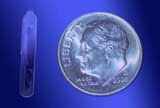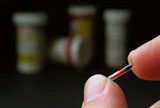 | To Chip or Not to Chip? |
 | To Chip or Not to Chip? |
|
By Ellen Kuwana Neuroscience for Kids Staff Writer May 21, 2002 She gazed up at me with her trusting brown eyes as the large needle approached her skin; in a moment it was over. She didn't even flinch. A small chip with a unique identification number was now embedded in her body -- if she ever got lost, a scanner could read the chip and she could be identified as mine and returned. Science fiction? No, this is what really happened when I had my dog microchipped, a $30-$40 procedure that has been available for the past 15 years. It makes me feel that my pet is safer. At the time I joked that I wanted a chip for my two-year-old daughter. Now this technology is indeed making its way to humans. This month, a family of three was implanted with computer chips slightly larger than a grain of rice. The procedure, performed under a local anesthetic, took about 10 seconds for each person. The microchips, manufactured by the VeriChip company, are not regulated by the Food and Drug Administration (FDA) because they are not classified as medical devices. The VeriChip will sell for approximately $200 and a scanner needed to read the information on the chip will cost $1,000-$3,000. |  The VeriChip Image used with the permission of Applied Digital Solutions. |
 Photograph by Greg Whitesell |
The chips emit a radio frequency signal that transmits an ID number.
The ID number can be matched to a database that contains medical
information supplied by the patient. At this point, the information is
limited to phone numbers and a list of the patient's medications. Someday,
the chip could contain more detailed medical information, such as
allergies to certain medications and previous medical conditions. The
chip could also be linked to Global Positioning System (GPS) satellites
so that Alzheimer's disease patients who are
prone to wandering could be tracked. This use would require
FDA approval, so it would not be available for at least a few more years.
The immediate access to a person's medical history could improve emergency-room treatment, where time is crucial and sometimes the patient arrives unconscious. In such a situation, the chip would speak for the patient, providing medical personnel with important medical information. As with many new technologies, especially ones dealing with something as personal as medical history, ethical issues are being debated. Sure, it's great to be able to track your own child's whereabouts or have medical personnel know that you've had brain surgery -- but do you want others to know this information? How secure are these data? |
| References:
|
| GO TO: | Neuroscience In The News | Explore the Nervous System | Table of Contents |
![[email]](./gif/menue.gif) Send E-mail |
 Fill out survey |
 Get Newsletter |
 Search Pages |
 Take Notes |